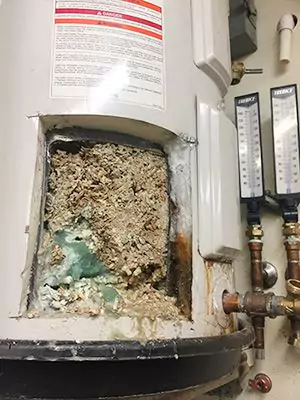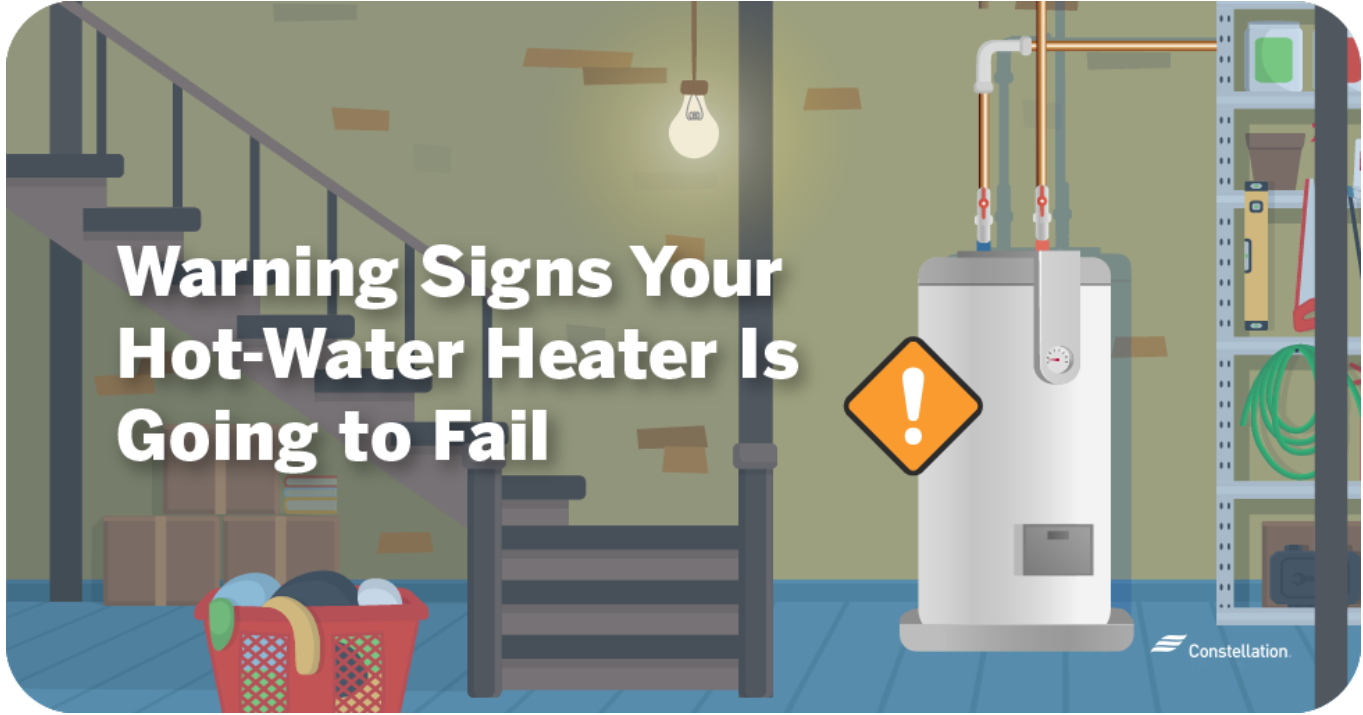Are you feeling the frustration of waking up to a cold shower or noticing strange noises coming from your water heater? These could be signs that your water heater is crying out for help.
Understanding the symptoms of a malfunctioning water heater can save you from unexpected cold spells and costly repairs. Imagine the relief of pinpointing the problem before it escalates, ensuring your home stays warm and your showers remain blissfully hot. Dive into this article to discover the tell-tale signs of a bad water heater and learn how to tackle them head-on, giving you peace of mind and comfort in your daily routine.
Page Contents
Common Signs Of A Failing Water Heater
Cold showers can be frustrating. Inconsistent water temperature is a sign of trouble. Fluctuating temperatures mean the heater struggles. It might need a fix soon.
Loud noises from your heater are not normal. These sounds often come from sediment buildup. This buildup causes rumbling or popping. Regular maintenance can help.
Water puddles near the heater are bad news. Leaks can damage your home. They might indicate a serious problem. Fixing leaks quickly is important.
Rusty or cloudy water is a warning. It may mean the heater is rusting inside. Rust can ruin the heater over time. This needs quick attention.
Most heaters last about 10-15 years. Old heaters often break down. Age affects efficiency. Consider replacing an old heater soon.

Credit: jacobsheating.com
Unusual Noises
Banging sounds from a water heater can signal trouble. These noises might mean sediment build-up inside the tank. As water heats, sediment moves and causes the banging. It’s crucial to address this issue. Ignoring it may lead to damage. The heater might become less efficient. This means higher energy bills. Regular maintenance can prevent these sounds. Flushing the tank removes sediment. This is a simple fix.
Popping noises are another sign of a problem. These often indicate mineral deposits. As water heats, trapped steam pops. It’s a common issue in areas with hard water. These sounds can worsen over time. They might lower the heater’s performance. Less hot water may be available. Descaling the heater can help. Regular cleaning helps prevent popping. This keeps the heater working well.
Inconsistent Water Temperature
Sudden shifts in water temperature signal trouble with your water heater. These fluctuations can indicate thermostat malfunctions or sediment buildup. A consistent temperature is vital for comfort and efficiency.
Fluctuating Temperatures
Water should stay warm. Fluctuating temperatures can be a big problem. Sometimes the water is hot. Other times, it is cold. This can happen often. It makes showers less pleasant. Old heaters can cause this. Sediment buildup is another reason. This can block the heat. A good check is needed. Call an expert if this happens.
Lukewarm Water
Water should be hot, not lukewarm. Lukewarm water can be annoying. It might feel cold in winter. This can mean the heater is weak. Heating elements might be broken. It can also be the thermostat. A water heater should heat well. If not, it needs fixing. Regular maintenance can help avoid this.

Credit: korrectplumbing.com
Discolored Or Rusty Water
Seeing rusty waterfrom your tap is not good. Your water heater might be sick. Rust can make your water look brown. This happens if the heater’s tank is old. An old tank can have rust inside. Rusty watercan be bad for health. It might have bad germs. Drinking it is not safe. Discolored watercan stain clothes. It can also stain dishes. If water looks dirty, the heater needs a check. Fixing it soon is smart. You might need a new heater. A plumber can help you. They know what to do. Keep your water clean. It’s important for you and your family.
Water Leakage
Spotting puddlesnear your water heater? This could mean trouble. A leak might be present. This is a common sign of damage. Small drips can grow into bigger leaks. It’s important to address this fast. Water can cause damage to floors. This might lead to costly repairs. Check your heater often for any puddles.
Rust on your water heater is not a good sign. It shows corrosion. This can weaken your heater. Rusty water is another symptom. Your pipes might be corroding. Rust can cause your heater to break. Regularly check for rust on the tank. Look for rusty water from taps too. Address these signs early to prevent issues.
Reduced Water Flow
Low water flow can be a big issue. Clogged pipes might be the reason. Sometimes mineral build-up blocks the way. This makes water flow slow. Old water heaters also cause this problem. They can’t push water well. Check showerheads and taps too. They might be blocked. A leak can also reduce flow. Water escapes before reaching you. Listen for strange sounds. They might mean trouble. Call a plumber if flow stays low. They can fix it fast. Don’t ignore the problem. It might get worse. Fixing early saves money.
Clean your heater often. This helps keep flow strong. Use a soft brush to clean. Make sure to remove all dirt. Follow the manual guide. It shows how to clean it right. Regular checks keep your heater healthy. This ensures hot water flows well.
Foul Odors
A metallic smell from your water heater is a bad sign. It may mean the tank is rusting. Rust can make your water taste like metal. This is not safe to drink. Iron and other metals might be in the water. This is why the water smells. It is important to fix this problem soon. A rusty tank can start to leak. Leaks can cause damage to your home.
A sulfurous odor smells like rotten eggs. It means bacteria is in the water heater. Bacteria can grow when the water is warm and not moving. This smell is unpleasant and can make water taste bad. The anode rod inside the heater may be causing this. Replacing the rod can help. Cleaning the tank can also fix this issue. Always ensure your water heater is working well.

Credit: blog.constellation.com
Unexpected Energy Bills
Sudden changes in energy bills can be confusing. Old water heaters often use more power. This makes bills rise quickly. Newer models save energy. Older ones do not. Rusty tanks or leaking pipes make the heater work harder. This uses more electricity. A broken thermostat can also lead to high bills.
Regular maintenance is important. It helps keep costs down. Checking for leaks or rust is a good start. If your bill is too high, call a plumber. They can find out what’s wrong. Fixing small issues early saves money. It also keeps your heater working longer.
Age Of The Water Heater
The age of a water heater matters a lot. Older heaters often have problems. A heater over 10 years old might not work well. It might not heat water properly. Rust and leaks can happen more often. These signs show the heater is aging. Regular checks help spot issues early. If your heater is old, consider a new one. Modern heaters are more efficient. They save energy and money. Always check the heater’s age first.
When To Call A Professional
Strange noises from your water heater? This is not normal. A professional should check it. Rusty water is another sign. It shows the tank might be rusting inside. Cold water from a hot tap is a big red flag. The heater might be broken. Water leaks around the heater mean there’s a problem. It could flood your home.
Check your heater’s age. Older than ten years? It might need replacing. High energy bills can also mean it’s not working right. Pilot light keeps going out? A professional needs to look at it. Always ensure safety first. Leave repairs to the experts.
Conclusion
Identifying bad water heater symptoms is crucial. It prevents costly repairs. Listen for strange noises. Watch for rusty water. Monitor inconsistent temperatures. These signs suggest potential problems. Early detection saves money and stress. Regular maintenance extends your heater’s lifespan. Always consult a professional for advice.
Stay informed and proactive. This ensures efficient water heating. A well-functioning heater enhances home comfort. Remember, small issues can escalate. Act promptly to avoid bigger troubles. A little vigilance goes a long way. Keep your heater in top condition. Enjoy uninterrupted hot water all year round.
